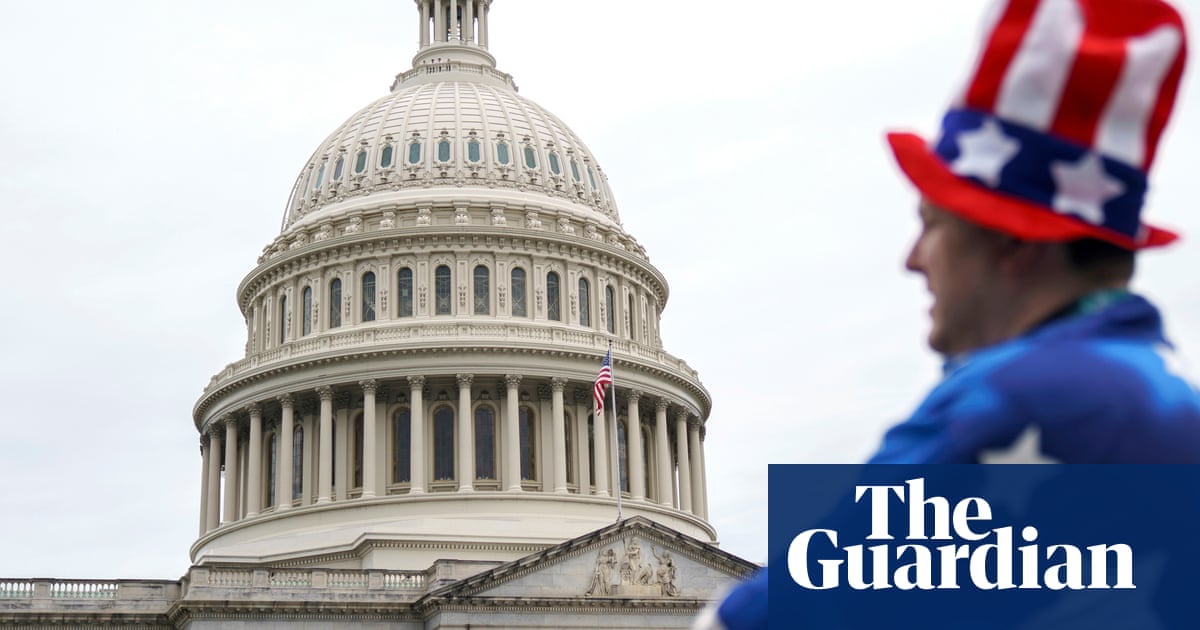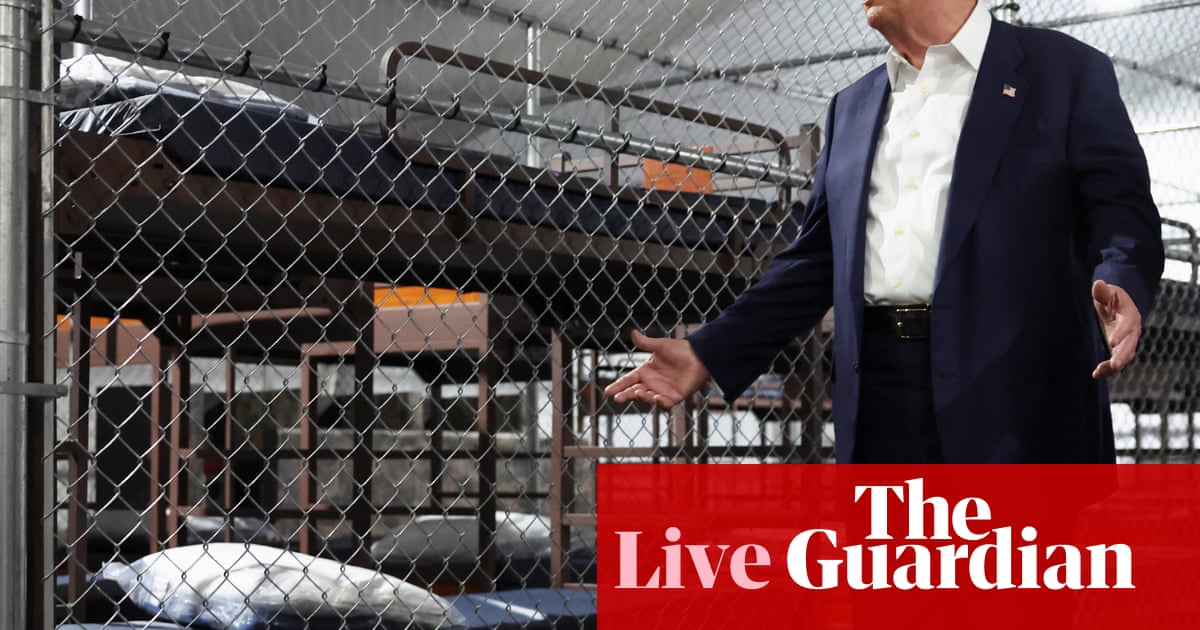Ever since Donald Trump returned to power, he has carried out an unprecedented assault against the country’s rule of law. But we can be thankful that one group of people – federal district court judges – have bravely stood up to him and his many illegal actions.
His excesses include gutting federal agencies, deporting immigrants without due process, seeking to cut thousands of federal jobs despite their legal protections, and ordering an end to birthright citizenship. Intent on upholding the constitution and rule of law, district court judges have issued more than 190 orders blocking or temporarily pausing Trump actions they considered illegal. Their decisions have slowed the US president’s wrecking ball as it demolishes federal agencies, devastates foreign aid, decimates scientific research and demoralizes government employees.
Those of us who held out hope that the supreme court, as rightwing as it has become, would join the district courts and stand up to Trump had our hopes dashed in a big way last week. The six hard-right justices delivered a major victory to Trump as they rolled over like puppies and ruled that district court judges can no longer, except in very limited circumstances, issue nationwide injunctions to halt Trump’s illegalities.
In the 6-3 decision, the justices ruled that when district judges are convinced that a presidential action is illegal, they can issue injunctions that only cover the plaintiffs who brought the lawsuit – they can only issue nationwide injunctions if they conclude that such action is the only way to assure complete relief to the plaintiffs. (The court wrote that plaintiffs might still be able to win broad injunctions by bringing class actions.)
That case, Trump v Casa, involved Trump’s executive order that prohibited birthright citizenship – despite the 14th amendment’s language specifically guaranteeing it. In that case, Trump challenged district court judges’ nationwide injunctions upholding birthright citizenship – three district court judges had found Trump’s order to be unconstitutional and issued nationwide injunctions. In the Casa case, the justices limited their ruling to the validity of nationwide injunctions, without ruling on the constitutionality of Trump’s ban on birthright citizenship.
In a stinging dissent, Justice Sonia Sotomayor accused the court’s supermajority of “complicity” with Trump’s efforts to make a “solemn mockery of our Constitution”. With Justices Elena Kagan and Ketanji Brown Jackson joining her dissent, Sotomayor wrote that “by stripping federal courts” of their extensive injunctive powers, the supreme court “kneecaps the Judiciary’s authority to stop the Executive from enforcing even the most unconstitutional policies”.
There are two big problems with the Casa decision. First, it gives a red light to what has been the most effective check on Trump’s illegalities and authoritarian power grab. Second, the ruling gives a gleaming green light to Trump to speed ahead with more illegal actions, knowing that district court judges will be far less able to crack down effectively on his lawless acts.
For the liberal justices and many Trump critics, a huge concern is that when a district court judge now finds a Trump policy to be unlawful, the judge can enjoin it only for the plaintiffs in the case. Meanwhile Trump can continue imposing that policy in the 49 other states. In her separate dissent, Jackson wrote: “The Court’s decision to permit the Executive to violate the Constitution with respect to anyone who has not yet sued is an existential threat to the rule of law.”
One thing seemed extraordinarily obtuse about the supermajority’s decision: they seemed infinitely more concerned that a district court judge’s nationwide injunction might exceed that judge’s legal authority than they were concerned about Trump’s unprecedented authoritarian actions and illegal excesses: his freezing congressionally-approved funding, his siccing the justice department on critics, his ordering retribution against law firms that hired lawyers he didn’t like, his freezing billions in grants to universities because they have diversity policies he detests.
In the majority opinion, Justice Amy Coney Barrett wrote that judges don’t have “unbridled authority” to ensure that presidents comply with the law. While many political scientists are sounding the alarm that Trump is creating an authoritarian presidency insufficiently checked by the constitution’s separation of powers, Barrett warned of an “imperial judiciary”. The conservative supermajority failed to see the authoritarian forest for the trees; they seem blind to who is the real threat to our democracy. It isn’t district court judges upholding the law. It is a president who has suggested he’s above the law.
The Casa decision continues a dangerous pattern in which the conservative justices bow to Trump. In another case last week, the court issued an unsigned decision, with the three liberal justices dissenting, that in effect said it was fine for Trump to deport immigrants to third countries, rather than their own, without giving them a chance to be heard about why that third country might be dangerous for them. Not only did the court let the Trump administration short-circuit due process in that case, but it gave Trump a victory in a case where his administration had twice disobeyed a district court judge’s orders. By failing to criticize the administration’s brazen defiance of a lower-court judge, the supermajority dangerously seemed to signal that it is OK for the administration to flout district judges’ orders.
In another important case, the court ruled for Trump by halting a lower court’s order that Gwynne Wilcox be reinstated to the National Labor Relations Board, after Trump fired Wilcox without giving any reason, despite federal law saying NLRB members can be fired only for malfeasance. Then there was last year’s disastrous immunity decision, in which Chief Justice John Roberts, as if in a creative writing class, seemed to magically add new clauses to the constitution. Roberts’s majority ruling granted Trump presumptive immunity from criminal prosecution for “official presidential acts” – a ruling that many legal scholars say has emboldened Trump to violate the law.
Assuming the conservative supermajority wants to preserve our democracy and defend our constitution, it’s maddening and perplexing that they keep delivering victories to Trump. Perhaps they rule for him because they watch Fox News too much and believe Trump is a paragon of upholding the law. Or perhaps the justices fear that Trump will savage and ridicule them if they dare rule against the Maga king. Or perhaps the justices rule repeatedly for Trump because they fear he will defy their decisions if they rule against him – and they’ll become the first supreme court in history that a president repeatedly defies.
In what is often called the most important supreme court case in history, Marbury v Madison, Chief Justice John Marshall wrote in 1803 that “it is emphatically” the role of the judiciary “to say what the law is”. Sadly, last week’s Casa decision turned Marbury on its head in many ways. By limiting the ability of district court judges to say what the law is and make sure the executive follows it, the court’s supermajority is giving Trump far more power than before to “say what the law is”. Without district courts able to issue quick nationwide injunctions to curb Trump’s many illegalities, it may take a year or two or more before the supreme court acts to put a nationwide halt to some of Trump’s more egregious illegal actions.
Considering that Trump has described himself as king and talked of suspending the constitution, the supreme court is making a dangerous mistake in giving Trump more power while hamstringing the ability of brave, principled judges to rein in his excesses.
-
Steven Greenhouse is a journalist and author, focusing on labour and the workplace, as well as economic and legal issues

 German (DE)
German (DE)  English (US)
English (US)  Spanish (ES)
Spanish (ES)  French (FR)
French (FR)  Hindi (IN)
Hindi (IN)  Italian (IT)
Italian (IT)  Russian (RU)
Russian (RU)  17 hours ago
17 hours ago
























Comments